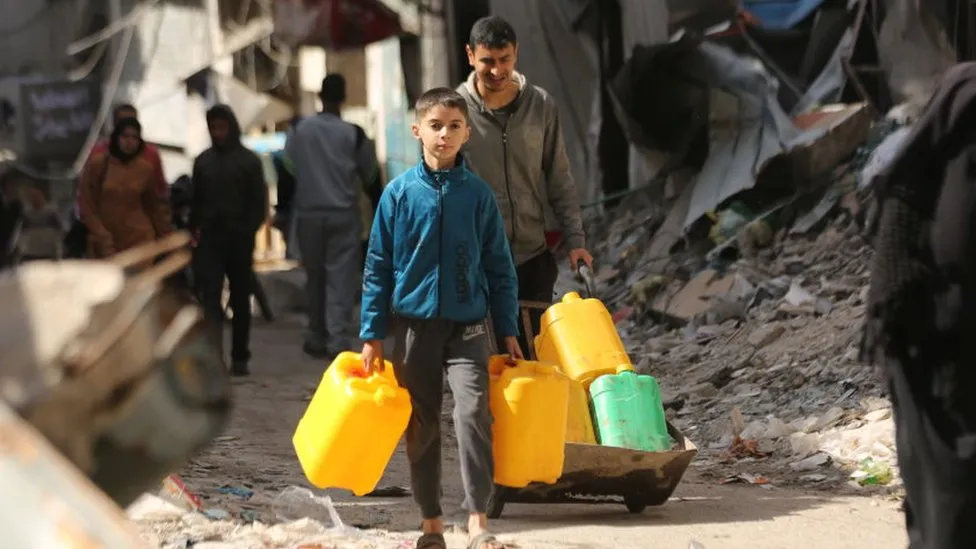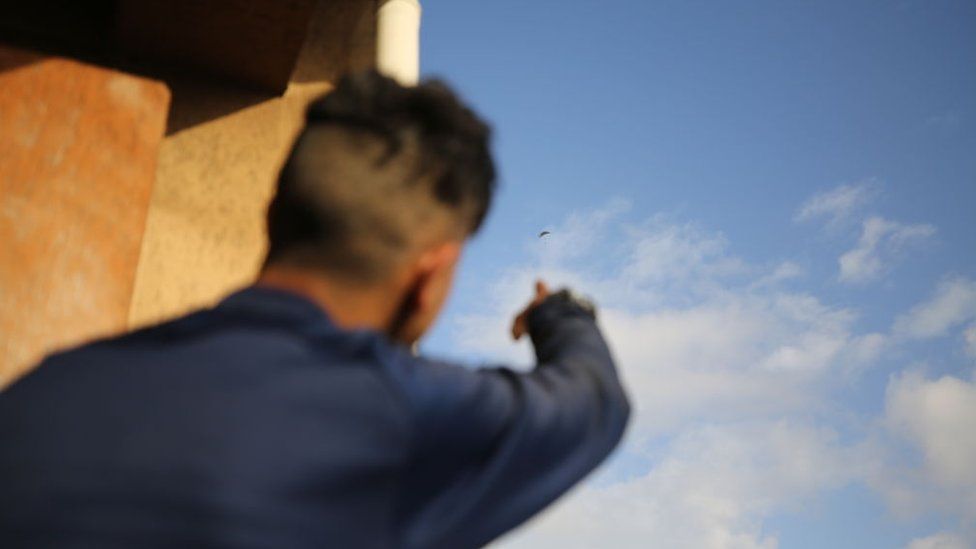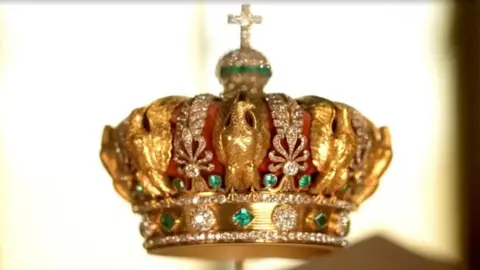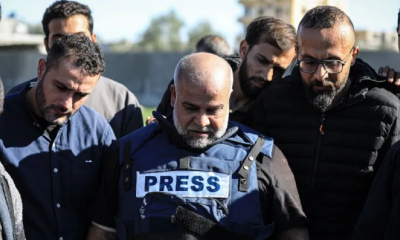Foreign News
Hopes for ceasefire in Gaza falter ahead of Ramadan

Hopes had been high over the past week following talks in Paris that there could be a new Gaza ceasefire deal in place for the start of the Islamic holy month of Ramadan next week.
However, while Hamas has now sent a delegation to Cairo for further negotiations with Egyptian and Qatari mediators, Israel has not. This looks like a serious new block.
Israeli officials – quoted in local media – demand clear answers from Hamas on key issues as well as a list of the surviving Israeli hostages who could be released with an agreement.
Meanwhile, a senior Hamas official, Dr Basem Naim, told the BBC on Sunday that “practically, it is impossible to know who is still alive” because of continuing Israeli bombing. “They are in different areas with different groups. We have asked for a ceasefire to collect that data,” he added.
Dr Naim went on to say that such “valuable information” about the hostages could not be given “for free”. He, and other senior Hamas figures, have also been continuing to demand a full ceasefire and withdrawal of Israeli troops from Gaza, rather than a temporary truce.
The US and regional players with leverage will now be putting pressure on both Israel and Hamas trying to shore up recent progress on the potential deal.
This would reportedly see some 40 Israeli hostages released in exchange for about 10 times as many Palestinian prisoners being freed from Israeli jails. More than 130 hostages are still believed to be held by Hamas. Israeli officials have said that at least 30 of them are dead.
Over the course of a proposed 40-day truce, there would be a surge in desperately needed aid entering into Gaza.
Without a deal, there is a higher threat of a further spread of tensions during Ramadan, which this year is due to begin on 10 or 11 March, depending on the lunar calendar.
Israel is expected to impose restrictions on access for Palestinians to the holiest Muslim site in occupied East Jerusalem, the al-Aqsa Mosque compound, citing its security concerns.
The site – which is also the holiest place in Judaism, known as Temple Mount – has often been a flashpoint for violence in the decades-old Israel-Palestinian conflict.
Hamas is well aware of international fears about a new conflagration and has previously used al-Aqsa to raise the stakes.
Last week, in a televised address, the leader of the Islamist group, Ismail Haniyeh, claimed Hamas was showing flexibility in negotiations, but also called on Palestinians in the occupied West Bank and Jerusalem to march to the mosque to pray on the first day of Ramadan.
International pressure for a ceasefire deal has ratcheted up with the dire humanitarian conditions in Gaza where, according to the UN, hundreds of thousands of people are facing famine following nearly six months of war.
“Given the immense scale of suffering, there must be an immediate ceasefire for at least the next six weeks, which is what is currently on the table,” the US Vice-President Kamala Harris told an event in Alabama. “This will get the hostages out and get a significant amount of aid in. People in Gaza are starving. The conditions are inhumane and our common humanity compels us to act,” Ms Harris went on.

,The United States has begun making aid drops into Gaza (BBC)
Her comments were some of the strongest language used yet to describe the situation by a senior US government official and reflect the growing frustration within Washington – the closest ally of Israel – about developments in the war.
Increasingly what is happening on the ground in Gaza is hurting President Biden’s presidential re-election campaign.
In Israel, there is also intense domestic pressure on the war cabinet to agree a new deal from the families of the hostages.
Thousands of Israelis joined them for the last leg of a four-day solidarity march, which began close to the Gaza border at one of the sites that was a focus of the deadly 7 October Hamas attacks, and ended in Jerusalem on Saturday night.
They held up Israeli flags and posters of the hostages.
Speaking at the rally, Sharon Sharabi whose brother, Eli, is still believed to be held in Hamas captivity, said: “We’ve lost four members of our family, the Sharabi family – my family, your family. We do not intend – listen carefully, leaders of Israel – we do not intend to bring a fifth coffin here.”
(BBC)
Foreign News
King Charles to host Nigeria’s first UK state visit in 37 years

King Charles III and Queen Camilla will host Nigeria’s president in the country’s first state visit to the UK in 37 years, Buckingham Palace has announced.
Bola Tinubu and First Lady Oluremi Tinubu have accepted an invitation to be guests of the King at Windsor Castle from 18 to 19 March.
State visits are considered a form of soft-power diplomacy, using the pomp of royal hospitality to strengthen relations with important international partners.
The last Nigerian state visit to the UK took place in 1989, when military ruler Gen Ibrahim Babangida travelled to meet the late Queen Elizabeth II for a four-day trip.
Although this will be Tinubu’s first formal state visit to the UK, he has already met the King since taking office following Nigeria’s disputed election in 2023.
Tinubu and his wife were received at Buckingham Palace in September 2024 and also held a bilateral meeting with the King on the sidelines of the COP28 summit in Dubai.
But a state visit allows for ceremonial pageantry aimed at elevating the occasion and demonstrating the importance with which the UK views those visiting.
The visit comes at a time of improving diplomatic and economic links between the UK and Nigeria – with trade between the two worth more than £8bn in the year to October, government figures show. This makes the African nation one of the UK’s most important partners in the continent.
In 2024, the two countries signed a new trade and investment partnership designed to expand opportunities for business.
The agenda for the March visit has not been disclosed, nor details of the events planned for it – but state visits typically include carriage processions and a state banquet, and usually coincide with visiting leaders having political meetings.

In 2025 alone, the King presided over three state visits – those of French President Emmanuel Macron, US President Donald Trump and German President Frank-Walter Steinmeier – the first time the UK had held such a number in a single year since 1988.
The King has longstanding ties to Nigeria, a Commonwealth country, having expressed a love for Pidgin English and Nigerian Afrobeats music.
Before becoming monarch, he visited the country four times as the Prince of Wales – in 1990, 1999, 2006 and 2018. Camilla, then the Duchess of Cornwall, joined him on the latter trip.
In 2023, the King’s Trust International – formerly the Prince’s Trust – officially launched in Nigeria, announcing a project aimed at tackling youth unemployment.
[BBC]
Foreign News
Colorado funeral home director sentenced to 40 years for corpse abuse

The co-owner of a Colorado funeral home where nearly 200 decaying bodies were found has been sentenced to 40 years in prison for corpse abuse.
Before Jon Hallford was sentenced, he apologised in court and listened to family members describe having nightmares about their loved ones decomposing in his care. They called him a “monster” who should rot in jail.
His ex-wife and co-owner Carie Hallford has pleaded guilty to similar charges and is awaiting sentencing.
The Return to Nature home, in the town of Penrose, Colorado, had given fake ashes to grieving relatives instead of their loved-ones’ remains. Prosecutors said 189 bodies were improperly stored in the building over four years.
Foreign News
Louvre Museum crown left crushed but ‘intact’ after raid

The crown of French Empress Eugenie was left crushed after being dropped by fleeing thieves during the raid at the Louvre last October – but is “nearly intact” and can be fully restored, the museum has said.
Raiders stole an estimated 88 million euros (£76m, $104m) in jewels, but left the diamond-studded headpiece belonging to the wife of Napoleon III on their escape route.
The museum has issued the first photographs of the crown since the theft, saying it had been left “badly deformed” after the thieves tried to remove it through a narrow hole they sawed in its glass display case.
The crown is missing one of eight golden eagles that adorned it but retains its 56 emeralds and all but 10 of its 1,354 diamonds.

It added the 19th Century crown would be restored to its original state “without the need for reconstruction”.
An expert committee led by the museum’s president Laurence des Cars had been selected to supervise the restoration.
The heist took place on 19 October and saw the gang use a stolen vehicle-mounted mechanical lift to gain access to the Galerie d’Apollon (Gallery of Apollo) via a balcony close to the River Seine.

Two of the thieves got inside by cutting through the window with power tools. They then threatened the guards, who evacuated the area, and cut through the glass of two display cases housing jewellery that once belonged to French royalty or its imperial rulers.
Prosecutors said the thieves were inside for less than four minutes before making their escape on two scooters waiting outside.
Police have arrested four male suspects who prosecutors allege are the thieves – but the mastermind behind the raid has not been tracked down.
The seven other items of jewellery taken, including a diamond-studded tiara that belonged to Eugenie and necklaces, ear-rings and brooches remain missing.

[BBC]
-

 Business1 day ago
Business1 day agoZone24x7 enters 2026 with strong momentum, reinforcing its role as an enterprise AI and automation partner
-

 Business5 days ago
Business5 days agoSLIM-Kantar People’s Awards 2026 to recognise Sri Lanka’s most trusted brands and personalities
-

 Business6 days ago
Business6 days agoAll set for Global Synergy Awards 2026 at Waters Edge
-

 Business1 day ago
Business1 day agoHNB recognized among Top 10 Best Employers of 2025 at the EFC National Best Employer Awards
-

 Business5 days ago
Business5 days agoAPI-first card issuing and processing platform for Pan Asia Bank
-

 Editorial3 days ago
Editorial3 days agoAll’s not well that ends well?
-

 Business1 day ago
Business1 day agoGREAT 2025–2030: Sri Lanka’s Green ambition meets a grid reality check
-

 Features3 days ago
Features3 days agoPhew! The heat …

























